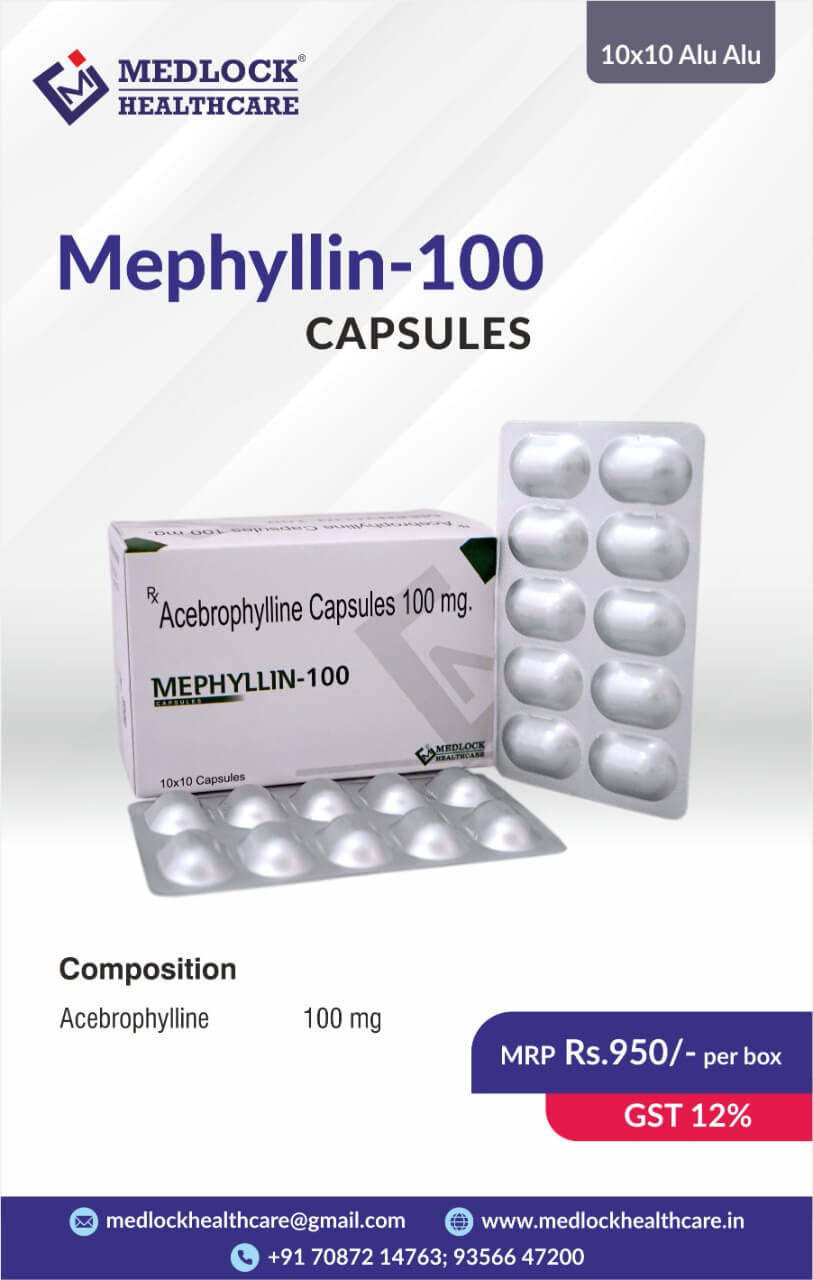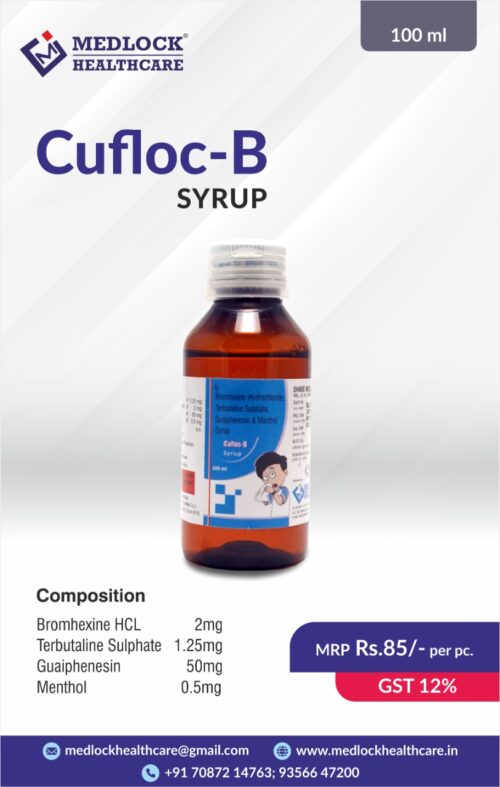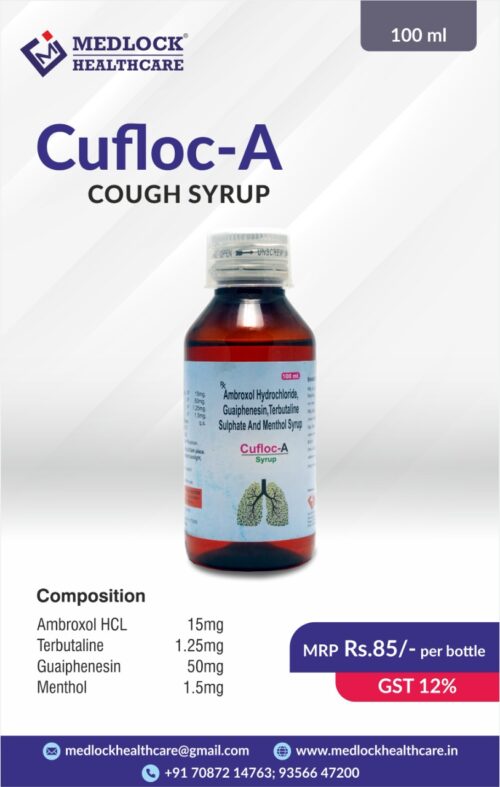Description
Acebrophyllin is a commonly prescribed drug used in the treatment and prevention of respiratory problems. More specifically it targets asthma (shrinking of airways making it difficult to breathe) and chronic obstructive pulmonary diseases (a group of lung problems that cause blockage in airflow). Acebrophylline is a kind of mucolytic (cough/sputum thinner) and bronchodilator. It works by relaxing the muscles of the airways and decreasing the density of mucus, to make it easier to breathe. The capsules do not work right away. Thus, asthma patients should always keep their inhalers nearby. Acebrophylline should be taken at the same time each day to maintain a constant level in the body. Taking the pills in the evening after a meal is suggested by many doctors.
Acebrophylline can be consumed in the form of tablets, capsules, and syrup. The active ingredient relaxes muscles in and around the airways and inhibits mucous secretion. Acebrophylline has many contraindications; hence, it should only be consumed when prescribed by a physician. A few contraindications of acebrophylline are; acute or chronic illness of the kidney and liver, hypotension (low blood pressure), fluctuating heartbeat, and allergy to acebrophylline, theophylline, or similar medicines. Let’s vividly discuss the side effects, drug interaction, and precautions of acebrophylline.
Side effects of Acebrophyllin
There is a wide range of side effects of consuming acebrophylline. Usually, these are moderate reactions and do not require medical attention. If the side effects escalate and start causing serious problems, immediate consultation from a doctor is required. Some common side effects of acebrophylline are:
- Dizziness
- Fever with chills
- Headache
- Numbness of the hands
- Sleeplessness
- Changes in blood pressure
- Increased heartbeat
- Unusual tiredness and weakness
- Indigestion
- Upset stomach
- Flatulence (Passing of gas)
- Nausea or Vomiting
- Diarrhoea
- Heartburn
- Gastrointestinal Bleeding
- Difficulty in breathing
- Skin rash
Drug Interaction of Acebrophyllin
When more than one drug is taken simultaneously or along certain food or beverages, its efficacy may come down to zero. This phenomenon is called a drug interaction. The combined effect of two drugs may cause undesirable reactions.
Interaction with Alcohol: There is no substantial proof that indicates the ill effects of consuming alcohol under the influence of acebrophyllin. To avoid any allergic reaction, a doctor’s consultation is advised.
Interaction with Medicines: There is a list of medicines that are recommended not to be taken along with acebrophyllin. These medicines are;
- Allopurinol
- Phenytoin
- Cimetidine
- Verapamil
- Erythromycin
Interaction with Diseases: The list of diseases that have cases of drug interaction with acebrophyllin are:
Hyperthyroidism – People suffering from Hyperthyroidism have an overactive thyroid gland that secretes excess thyroxin. Acebrophyllin should be used with caution by all patients of hyperthyroidism as it might make the condition worse.
Cardiovascular Problems – Everyone who has a medical history of cardiovascular disease or is currently suffering should avoid taking acebrophyllin. Patients with low blood pressure, heart attacks, irregular heartbeat, and hypertension are all covered in cardiovascular problems. Consumption of acebrophyllin will worsen all these conditions.
Liver/kidney impairment – As acebrophyllin accumulates in the body, everyone suffering from liver and kidney problems should steer clear of it. The usage of acebrophyllin will harm the liver and kidney’s patient.
Peptic ulcer – Peptic ulcers are sores in the lining of your stomach and intestine. Acebrophylline should be avoided at all costs if you have peptic ulcers as it may worsen your health condition.
Precautions for using Acebrophyllin
- Do not interfere with the dosage of acebrophyllin prescribed by your doctor.
- Avoid smoking when taking this medicine as it might lessen the impact of acebrophyllin.
- Do not stop taking the medicine without a doctor’s consultation.
- Immediately consult the doctor on the continuation of any side effects.
- Do not take acebrophyllin without consultation, if pregnant or breastfeeding a child.
Frequently Asked Questions (FAQs)
1. Can I take acebrophylline during pregnancy?
Acebrophylline is not recommended to be used during the 9 months of pregnancy.
2. What are the side effects of acebrophylline?
Commonly experienced side effects are drowsiness, dizziness, nausea, vomiting, stomach discomfort, diarrhea, and constipation after taking acebrophylline.
3. When should Acebrophylline be avoided?
Acebrophylline should be avoided by patients allergic to ambroxol, Acebrophylline, or theophylline. Along with that, patients having low blood pressure, irregular heartbeats, liver disease, or kidney disorder should prevent Acebrophylline.






